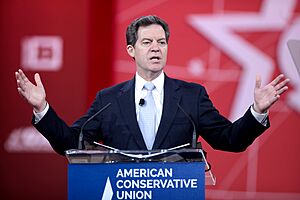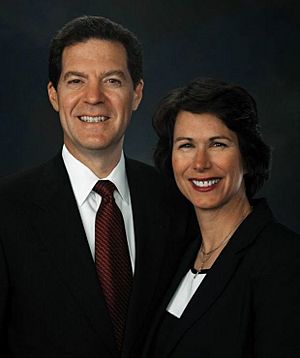Sam Brownback facts for kids
Quick facts for kids
Sam Brownback
|
|
|---|---|
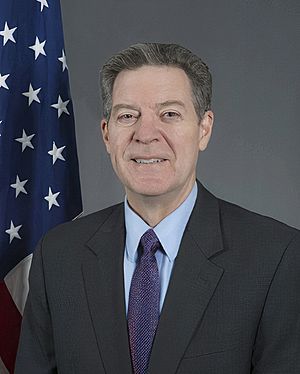
Official portrait, 2018
|
|
| 5th United States Ambassador-at-Large for International Religious Freedom | |
| In office February 1, 2018 – January 20, 2021 |
|
| President | Donald Trump |
| Preceded by | David Saperstein |
| Succeeded by | Rashad Hussain |
| 46th Governor of Kansas | |
| In office January 10, 2011 – January 31, 2018 |
|
| Lieutenant | Jeff Colyer |
| Preceded by | Mark Parkinson |
| Succeeded by | Jeff Colyer |
| United States Senator from Kansas |
|
| In office November 7, 1996 – January 3, 2011 |
|
| Preceded by | Sheila Frahm |
| Succeeded by | Jerry Moran |
| Member of the U.S. House of Representatives from Kansas's 2nd district |
|
| In office January 3, 1995 – November 7, 1996 |
|
| Preceded by | Jim Slattery |
| Succeeded by | Jim Ryun |
| Secretary of Agriculture of Kansas | |
| In office September 18, 1986 – July 30, 1993 |
|
| Governor | John W. Carlin Mike Hayden Joan Finney |
| Preceded by | Harland Priddle |
| Succeeded by | Philip Fishburn |
| Personal details | |
| Born |
Samuel Dale Brownback
September 12, 1956 Garnett, Kansas, U.S. |
| Political party | Republican |
| Spouse |
Mary Stauffer
(m. 1982) |
| Children | 5 |
| Education | Kansas State University (BA) University of Kansas (JD) |
| Signature | |
Samuel Dale Brownback (born September 12, 1956) is an American lawyer and politician. He has served in many important roles, including as a U.S. Senator and the 46th governor of Kansas. He was also the United States Ambassador-at-Large for International Religious Freedom for President Donald Trump.
As a member of the Republican Party, Brownback was known for his conservative views. He even ran for the Republican nomination for president in 2008.
Contents
Early Life and Schooling
Sam Brownback was born in Garnett, Kansas, and grew up on a farm in Parker, Kansas. He was very involved in the FFA (formerly Future Farmers of America) and became a national vice president for the group.
He went to Kansas State University and was elected student body president. He earned a degree in agricultural economics in 1978. Later, he went to the University of Kansas to get a law degree, which is called a J.D., in 1982.
Starting His Career
After law school, Brownback worked as a lawyer. In 1986, he was chosen to be the Kansas Secretary of Agriculture. He also worked for the U.S. government in a program called the White House Fellow program.
In 1994, he was elected to the U.S. House of Representatives. He served one term before running for the U.S. Senate in a special election in 1996. He won and was reelected two more times.
Serving as a U.S. Senator
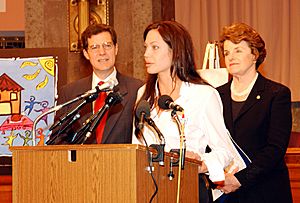
From 1996 to 2011, Brownback represented Kansas in the U.S. Senate. He was a member of several important committees, including the Judiciary Committee and the Appropriations Committee. These committees help make decisions about laws and how the government spends money.
In 2000, Brownback helped pass the Trafficking Victims Protection Act. .....
During his time in the Senate, Brownback was known for his conservative positions. In the mid-1990s, he hired Paul Ryan as a legislative director. Ryan later became the Speaker of the U.S. House of Representatives.
Running for President in 2008
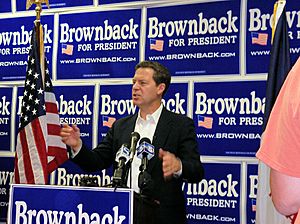
In 2007, Brownback announced he was running for president. He was popular with religious and conservative voters. He described himself as an "economic, a fiscal, a social and a compassionate conservative."
He participated in debates and campaigned in early states like Iowa. However, he struggled to raise enough money to continue his campaign. He dropped out of the race in October 2007 and later supported John McCain, who became the Republican nominee.
Governor of Kansas
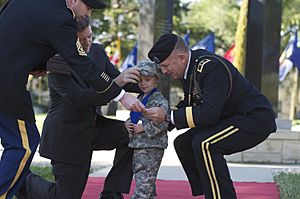
Brownback decided not to run for the Senate again in 2010. Instead, he ran for governor of Kansas and won. He served as governor from 2011 to 2018.
The Kansas Experiment
As governor, Brownback started what he called a "red-state experiment." In 2012, he signed a law that created one of the biggest income tax cuts in Kansas history. The goal was to boost the state's economy and create jobs.
The law lowered taxes for individuals and eliminated them for many business owners. Brownback hoped this would work like the policies of President Ronald Reagan.
However, the tax cuts caused the state to collect much less money than expected. This led to large budget shortfalls, meaning the state didn't have enough money to pay for everything. The government had to cut spending on important services like education and transportation.
In 2017, the Kansas Legislature voted to reverse the tax cuts to fix the budget problems. They even overrode Governor Brownback's veto to make it happen.
Education and Health Care
As governor, Brownback signed a bill that changed the rules for firing teachers. It also allowed schools to hire unlicensed teachers for some subjects. The state's budget cuts also meant less money for schools.
In 2013, Brownback turned down a $31.5 million grant from the federal government. The money was meant to help Kansas set up a health insurance marketplace under the Patient Protection and Affordable Care Act.
Ambassador for Religious Freedom
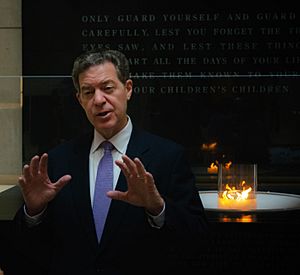
In 2017, President Donald Trump nominated Brownback to be the U.S. Ambassador-at-Large for International Religious Freedom. This job involves promoting religious freedom around the world.
The Senate confirmed his nomination in January 2018. Brownback then resigned as governor of Kansas and was sworn in as ambassador on February 1, 2018.
As ambassador, Brownback spoke out against countries that limit religious freedom, especially China. He pointed out the poor treatment of Uyghur Muslims, Tibetan Buddhists, and Christians in China. He served as ambassador until January 2021.
Political Positions
Throughout his career, Sam Brownback has been known for his strong conservative beliefs.
- Taxes: He believes that lower taxes help the economy grow. This was the idea behind his "Kansas experiment."
- Evolution: Brownback has said that he believes in "intelligent design." He supported teaching different views on the origin of life in schools.
- Immigration: In the Senate, he supported laws that would have given a path to citizenship for some immigrants. As governor, he took steps to limit the resettlement of refugees in Kansas.
- Foreign Policy: He supported the U.S. military's presence in Iraq and has been a strong supporter of Israel.
Personal Life
Brownback is married to Mary Stauffer. They have five children, two of whom are adopted. He converted to Catholicism in 2002.
Images for kids
-
Brownback with U.S. Marines in Iraq.
See also
 In Spanish: Sam Brownback para niños
In Spanish: Sam Brownback para niños
- United States immigration debate
- How Democracy Works Now: Twelve Stories


